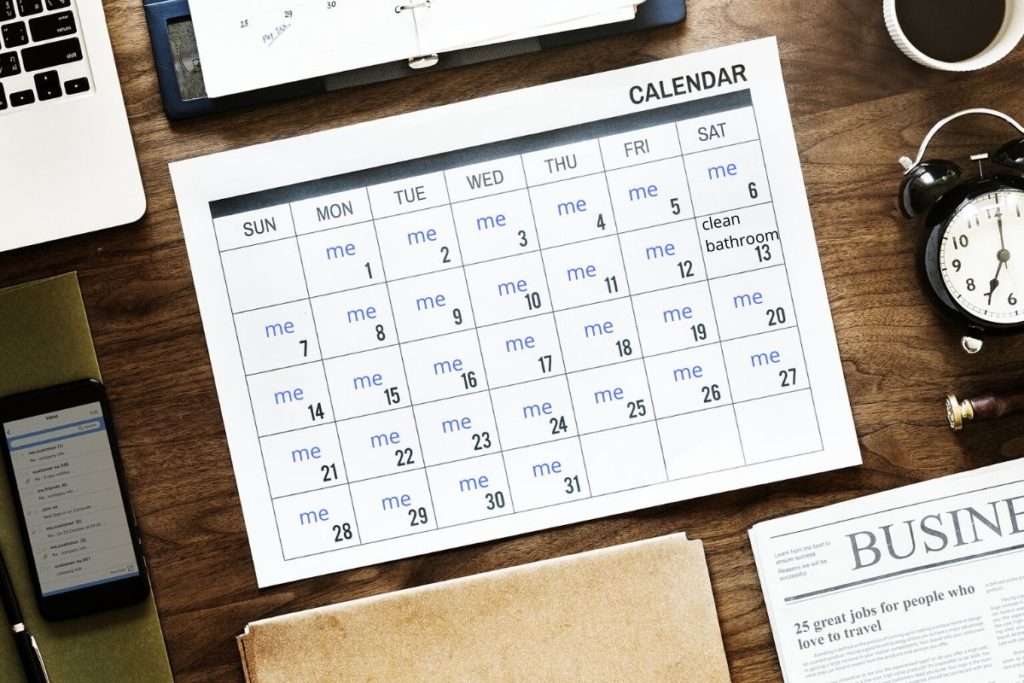
I mentioned in a previous post that I’m one of a number of people around the university currently working with EPSW and the team at the SAHMRI Wellbeing and Resilience Centre (SWRC) to build a new student wellbeing program/platform.
We met again today to go over the suggested session plan for the program. At this stage it is looking like a pretty comprehensive program – 5 x 2-4 hour sessions over 5 weeks with homework exercises.
This might sound like a lot, but in the program you’ll be guided through the process of building and implementing your own mental health and wellbeing strategy – not an insignificant task. Along the way, you’ll learn a stack about mental health, wellbeing and how to make meaningful positive changes in your life. As someone who is very interested in self-improvement obviously I got a little bit hand-flappy excited.
Given that the program is not yet available, I thought it might be helpful to extract from the meeting some pieces of advice for those looking to make improvements in their life. The list below isn’t in any particular order. Sometimes it is good to let advice fly around like demented birds.

Your personal mental health and wellbeing strategy will be similar but not the same as someone else’s
When people set off to improve their physical or mental health, there are a few common starting points such as nutrition, physical activity, sleep, and social support/connection.
But the intricacies of how you look after your health and how someone else does will differ. You might decide to focus on increasing your knowledge and skills through education. Another person might try to get their finances in order. Another person might focus on learning how to have fun.
The upside of this is that you can shape what wellbeing and mental health means to you. The downside is that responsibility and choice can be a bit overwhelming at first, especially if you just really want someone to tell you exactly what to do.
That choice is why I developed this document “Which areas of my life could I work on?” This might help you work out what your mental health and wellbeing strategy will focus on.
Developing your own mental health and wellbeing strategy is not an insignificant process
I really only started focusing on my health and wellbeing in my mid thirties. 7 years on, I am still refining my strategy.
Now it could be that I am just dense and the average person could achieve this much quicker, but what I think is more likely is that one’s mental health and wellbeing strategy is an ongoing investment.
And if it seems like that is time wasted to you, remember that your body and mind are the vehicles through which you experience the world. To focus on them is to improve your connection to the world.
Use questionnaires to help you highlight what you want to work on
In the earlier days of Facebook, it used to be the case that just about every day a new questionnaire was going around that invited you to learn more about yourself. Most of them were stupid like ‘what kind of pizza are you?’ or were actually gathering data to profile you for future advertising and fake news.
But some questionnaires available online can actually help you in the process of understanding yourself and identifying areas for change or improvement.
Let’s take a look at a few examples:
- The VIA Character Strengths Inventory helps you identify your strengths. For example, I did it and found my main strength was creativity, followed by kindness, humour and curiousity. I suck at love, teamwork and bravery. A funny coward 🙂 if you will. Knowing your strengths can help you target your efforts and resources to activities that build on those strengths.
- Online personality test. There are a lot of personality tests online, many of them bogus. I think I have found one that has a reasonable theoretical basis and generates usable results (note: do the short version). Personality is a complex topic, but simply put, your personality is your unique characteristic way of thinking, feeling and acting. I completed the test and was found to be introverted, reasonably agreeable, reasonably conscientious, high on neuroticism and reasonably open to experience. You could use results like this to identify areas for personal growth.
- Wellbeing, resilience, mood, anxiety, stress, healthy body. The SAHMRI wellbeing resilience centre who are leading the student program development have a measurement platform where you can take a wellbeing assessment on the six categories mentioned. This can give you a good overview of where you are current with your mental and physical health, kinda like the assessment a personal trainer does at the beginning of your new exercise program.
- The Black Dog Institute have a new online assessment that can help you better understand your mental health.
This is only a taster for what can be accessed online in terms of questionnaires to improve your understanding of yourself. If you want to find more questionnaires, try https://discovermyprofile.com/
Now I warn you, there are lots of crappy questionnaires online and telling the difference between the good ones and bad ones can be difficult. As a general rule, those that are associated with universities or research institutes are usually better quality. Sites that try to sell you (at an exorbitant cost) the results of the questionnaire should be avoided.
Developing your own wellbeing strategy will take some trial and error
On your quest for mental health and wellbeing, you’ll inevitably make a few missteps. You’ll try some things that don’t work. You’ll discover that something you really thought would help, did not.
The pleasant counterpoint to this is that a deliberate commitment to improving your mental health will reveal some unexpected pleasant surprises. I discovered that house decluttering makes me super happy. I discovered that a 10 minute walk with a colleague was enough to rejuvenate me after a difficult morning. I discovered that doing a budget actually made me very happy.
Expect the journey of self-improvement to be a ‘two steps forward, one step backward’ kind of thang, with some unexpected victories and failures.
Working on your mental health doesn’t necessarily mean doing ‘mental health stuff’
Some people associate working on one’s mental health with traditional mental health activities such as:
- taking a medication (e.g. anti-depressant)
- going to therapy (e.g. seeing a psychologist)
- taking some time off (e.g. ‘mental health day’)
Now these can certainly be good options, but working on one’s mental health doesn’t mean you are limited to these kinds of activities. Some people get their mental health benefits through exercise, or hobbies, or regular social events with close friends. Some people find their mental health in good books or ongoing education.
Working on your mental health doesn’t necessarily need to feel like therapy.
Define what you are working towards
When you set off in your car for the day, you typically have a destination in mind.
So what is your destination when you make a decision to start a new exercise program or get more sleep or learn a new topic?
You’ll hear people crap on about goals a lot, including me. The reason is that we need to attach our decisions and actions in the present moment to something that transcends the present moment, otherwise we’d simply make choices on whatever was best for us in the present moment.
For example, if we didn’t have goals about having good health in the future, we’d more commonly pick the donut rather than the salad.
If we didn’t have the goal of getting a degree to get a good job, we’d pick Netflix over doing our assignment.
Our impulses would make the decisions.
You can articulate your goals in a number of different ways:
- Specific big achievements: clearly definable outcomes – e.g. getting your degree, getting a job, earning $100,000+ dollars a year
- Specific little achievements (often what is required to get the big achievements) – e.g. getting all assignments in before due date, reading a book per month, meditating 5 minutes a day
- Specify the type of person you want to be – e.g. friendly, kind, productive – and then define what that would look like behaviourally and strive for that.
- What legacy would I like to leave? – think about what contribution you’d like to make to the world and then identify the short, medium and long-term things you’ll need to do to make that contribution
- Identify people you admire and watch what they do and mimic it
Regardless of how you articulate your goals, it is important to have them, so that you have an alternative to your moment-by-moment impulses when making decisions and choices.
Mental wellbeing is just one type of wellbeing
There is physical wellbeing, intellectual wellbeing, spiritual wellbeing, social wellbeing, financial wellbeing, environmental wellbeing, occupational wellbeing and probably a lot more.

I tell you this not to freak you out about how many different types of wellbeing you need to work on, but rather to let you know there is choice in where you start your overall wellbeing journey.
These areas of wellbeing are highly interconnected, so positive changes you make in area will flow into other areas. For example, learning more about budgeting/saving/investing (financial wellbeing) had a profound impact on my mental health.
Your underlying attitude or mindset will influence how you go about making improvements
You may have heard the term ‘fixed vs growth mindset’. It pops up a lot in education and psychology settings.
It refers to two attitude sets that people often hold in relation to learning and achievement.
A fixed mindset holds that our talents and abilities are mostly set in place, with little room for improvement. People who hold this mindset are more likely to try and find ‘what they are good at’. They get disappointed and dejected if they find they aren’t good at something, because they feel it reflects an underlying skill/ability deficit.
A growth mindset holds that our talents and abilities are modifiable through deliberate practice. People who hold this mindset are more likely to assume that persistence and effort are the keys to becoming good at something, rather than just natural or innate ability.
These mindsets have implications for how a person pursues personal growth. Not surprisingly, those with a growth mindset will more likely hold the opinion that personal growth is possible.
We each hold many different beliefs about personal growth and improvement, and these will influence how we go about making improvements. Many of these beliefs are held implicitly, rather than explicitly. This means we aren’t actually aware that we hold these beliefs and they operate under conscious awareness.
For example, we see a lot of students who become highly self-critical about their study struggles. They insult themselves when they do badly on an assignment. They constantly criticise themselves in their struggles against procrastination.
When it is pointed out to them that, at some level, they probably hold the belief that self-criticism is a good motivator, they become confused. They know that doesn’t sound right and they wouldn’t apply that logic to a loved one, but they are applying that logic to themselves. Their mindset, with regards to their own improvement is highly self-critical.
One of the things we might do in that situation is to encourage them to practise adopting a different mindset – one based on self-compassion. Self-compassion still allows them to feel disappointed or annoyed in relation to their behaviour, but reminds them that such struggles are uniquely human, and that most humans are motivated by encouragement to try new things, rather than criticism of past behaviours.
The takeaway point here is that as you pursue making improvements in your life, you will encounter your attitudes towards self-improvement. You might dismiss successes or criticise failures. You may question your abilities and capabilities. You may find yourself blaming others. The question to ask yourself is whether those emerging attitudes are helping you or hindering you. If they are hindering you, you might need to entertain a different way of approaching such situations.
If you are going to make a change in your life, take a little bit of time to plan it
If you had to organise a birthday party for a friend, you would likely perceive it to be an important task and allocate appropriate time and effort to planning it (unless you don’t really like the person 🙂 )
Yet, when we make a decision to improve our lives (equally as important if not moreso than the birthday party), we often allocate very little time to planning it. We decide we’ll ‘exercise more’ and then never really do much more planning than that.
My view is that you should honour the decision to improve yourself by allocating sufficient time and mental energy to planning the improvements you want to make. This is reflected in the fact that the SAHMRI wellbeing course isn’t just a 2-hour workshop. It is run over multiple days with many opportunities to specifically plan your improvement efforts.

How long should you try something before deciding if it is for you?
Not every change that you make to your life will be a winner.
In some cases it will obvious to you and anyone else that the change didn’t work. Those changes can be abandoned quickly.
But sometimes we make changes where it isn’t clear if it is having a positive effect. The effects might be subtle or take a while to accumulate.
For example, we commonly tell people who start taking an anti-depressant to wait a few weeks for the full effect to take hold. If they stop too early, they don’t get the full potential benefit.
So how long should you try something before deciding whether it is for you or not?
There are a few things to consider here:
- Are you doing it properly? You might have adopted a new study strategy (e.g. using flashcards) but aren’t sure if it is helping. First check that you are using them correctly by reading more about their use. Sometimes we dismiss certain changes but on reflection we hadn’t really implemented them properly in the first place.
- Do you have any process in place for understanding whether it is beneficial or not? It might be as simple as regularly asking yourself ‘does this make me feel better’ or you might be formally tracking your wellbeing using an app or you might check-in with a close friend to see if they’ve noticed any improvements. Regardless, you have to have some process in place to determine if a change you’ve made is helpful.
- Just about every change I’ve made in my life took longer than I expected and took longer to yield benefits than I expected.
- If anyone tells you that there is a specific amount of time that it takes to establish a new habit, then they are misinformed. It varies widely between person and also on the habit being formed.
- Some changes lead to more pain and discomfort in the early stages before the benefits accumulate. My first month of weight training was mostly pain and discomfort. People who start therapy sometimes see a spike in distress initially (because they are no longer avoiding distressing topics) before the benefits start to accrue. You may need to get over an initial hump to get the benefits.
Need to work on vs interested in working on
There are things in life that we need to work on and things we are interested in working on. A standard example for students is that you NEED to work on your assignments, but you might be INTERESTED in working on something else.
It isn’t my place to tell you what to work on, but be honest with yourself about what you are working on. Sometimes we avoid working on the things we NEED to, because they are a little more confronting than the ones we are INTERESTED in working on.
Don’t be embarrassed to take little steps
In fact, most change does actually occur incrementally, piece by piece. Small regular changes will add up over time.
Embarrassed that your new ‘exercise program’ is just a 5 minute walk at lunchtime? Don’t be. It is the first step in what will be a range of positive changes you make with your health in mind.

Unpleasant feelings might indicate you are headed in the right direction
Our brains are wired to motivate us to avoid things that make us uncomfortable or anxious or scared. This bias was what kept many of our ancestors from putting themselves in physically dangerous situations.
However this bias can get in the way when we are trying to make improvements in our life, because those first steps are often accompanied by doubt or fear or trepidation or confusion. In fact, study is full of situations which make us uncomfortable but actually make us better people: exams, tests, public speaking, being assessed etc.
It can be useful to reframe some negative emotional experiences as indicating you are headed in the right direction, especially if those feelings are arising in the context of you making deliberate changes to your life.
Change is a lifelong endeavour
I’ll let you in on a little secret.
You don’t have to fix every part of your life in the next week or month or even year.
You’ve got the rest of your life to improve. I’m 40+ and I’ve only just got started trying to build a better me.


Thanks Gareth – great article!
Thanks Kevin – I appreciate that 🙂